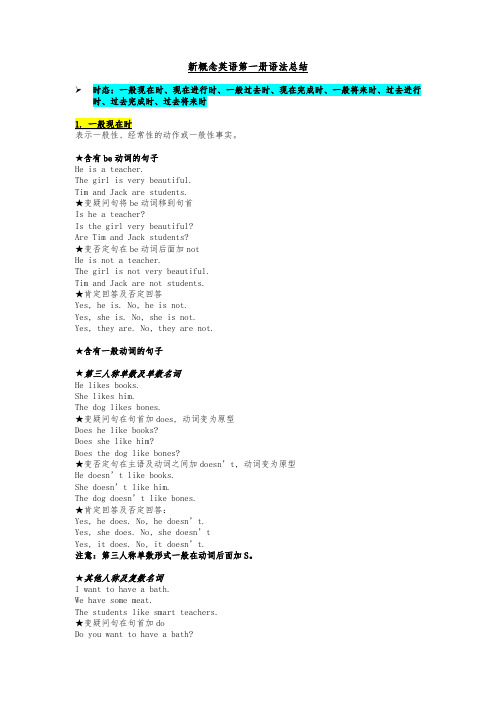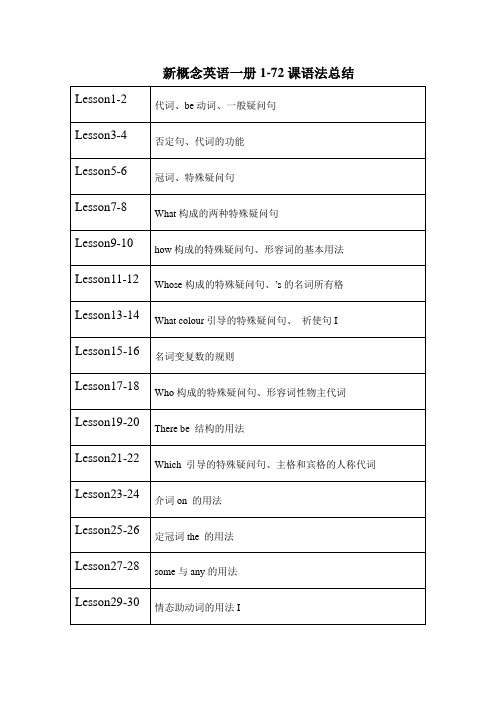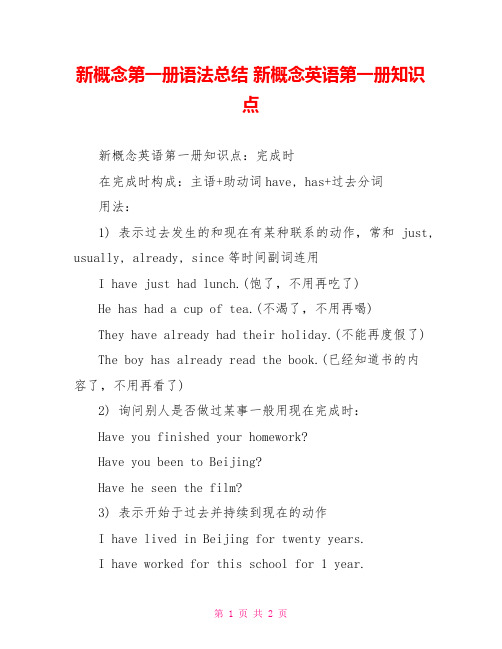新概念一语法知识点总结
新概念英语第一册语法知识点

新概念英语第一册语法知识点Revised on November 25, 2020★含有be动词的句子He is a teacher.The girl is very beautiful.Tim and Jack are students.★变疑问句将be动词移到句首Is he a teacherIs the girl very beautifulAre Tim and Jack students★变否定句在be动词后面加notHe is not a teacher.The girl is not very beautiful.Tim and Jack are not students.★肯定回答及否定回答Yes, he is. No, he is not.Yes, she is. No, she is not.Yes, they are. No, they are not.★含有一般动词的句子★第三人称单数及单数名词He likes books.She likes him.The dog likes bones.★变疑问句在句首加does, 动词变为原型Does he like booksDoes she like himDoes the dog like bones★变否定句在主语及动词之间加doesn’t, 动词变为原型He doesn’t like books.She doesn’t like him.Th e dog doesn’t like bones.★肯定回答及否定回答:Yes, he does. No, he doesn’t.Yes, she does. No, she doesn’tYes, it does. No, it doesn’t.注意:第三人称单数形式一般在动词后面加S。
★其他人称及复数名词I want to have a bath.We have some meat.The students like smart teachers.★变疑问句在句首加doDo you want to have a bathDo we have any meatDo the students like smart teachers★变否定句在主语和动词之间加don’t.You don’t want to have a bath.We don’t have any meat.The students don’t like smart teachers.★肯定回答及否定回答Yes, I do. No, I don’t.Yes, we do. No, we don’tYes, they do. No, they don’t.构成:主语+be动词+动词的现在分词+其它成分We are having lunch.He is reading a book.The dog is running after a cat.The boys are swimming across the river.★变疑问句将be动词移到句首Are we having lunchIs he reading a bookIs the dog running after a catAre the boys swimming across the river★变否定句在be动词后面加notWe are not having lunch.He is not reading a book.The dog is not running after a cat.The boys are swimming across the river.★特殊疑问句:what, which, how, where, who, etc.疑问词+be动词+主语+现在分词What are you doingWhat is she doingWhat is the dog doing没有进行时的动词(必背)表示状态、思想、感情、感觉的动词不能表示正在进行的动作1. 表示感觉、感官的词see, hear, like, love, want2. have, has作为动词”拥有”的含义时,没有进行时yesterday, last night, the day before yesterday, three days ago.含有be动词的句子,将动词变为过去式,am / is的变为was,are的变为wereI was at the butcher’s.You were a student a year ago.The teacher was very beautiful ten years ago.★变疑问句将be动词移动到句首Were you at the butcher’sWere you a student a year agoWas the teacher very beautiful ten years ago★变否定句在be动词后面加notI was not at the butcher’s.You were not a student a year ago.The teacher was not very beautiful ten years ago.★肯定回答否定回答Yes, I was. No, I was not.Yes, you were. No, you were not.Yes, he/she was. No, he/she was not.★特殊疑问句:What did you do不含有be动词的句子,将动词变为过去式,动词过去式构成见附录I finished my homework yesterday.The boy went to a restaurant.The Sawyers lived at King Streeta year ago.King Streeta year ago.★变疑问句在句首加did,动词变为原型Did you finish your homework yesterdayDid the boy go to a restaurantDid the Sawyers live at King Streeta year agoKing Streeta year ago★变否定句在主语和动词之间加did not,动词变为原型I did not finish my homework yesterday.The boy did not go to a restaurant.The Sawyers did not live at King Streeta year ago.King Streeta year ago.★肯定回答及否定回答Yes, I did. No, I didn’t.Yes, he did. No, he didn’t.Yes, they did. No, they did not.have/has+过去分词用法:1)表示过去发生且和现在有某种联系的动作,常和just, usually, already,since等时间副词连用I have just had lunch. (饱了,不用再吃了)He has had a cup of tea.(不渴了,不用再喝)They have already had their holiday. (不能再度假了)The boy has already read the book. (已经知道书的内容了,不用再看了)2)询问别人是否做过某事一般用现在完成时Have you finished your homeworkHave you been to BeijingHave he seen the film3)表示开始于过去并持续到现在的动作I have lived in Beijing for twenty years.I have worked for this school for 1 year.4)表示一种经历、经验:去过…地方,做过…事情,经历过…事情I have never had a bath.I have never seen a film.I have never been to cinema.I have ever been to Paris.Have been to表示去过,have gone to 表示去了I have been to London.(人已经回来)He has gone to London.(人还在那里)5)表示一种结果,一般不和时间副词联用I have lost my pen.I have hurt myself.He has become a teacher.She has broken my heart.句型变化:★变疑问句将助动词移到句首,变否定句在助动词后面加not.Have you lost your pen I have not lost my pen.★肯定回答及否定回答Yes, I have. No, I have not.★特殊疑问句:What have you doneWhat has he done一般过去时与现在完成时的区别:凡是有明确的表示过去的时间状语的句子为过去时注意:有些动词表示的动作有一个终点,不能再延续,因此不能和表示一段时间状语连用错:I’ve left Beijing for 3 days.对:I left Beijing 3 days ago. I have been away from being for 3 days.经常和tomorrow, next year, the day after tomorrow, the year after the next, in five hours’ time, etc. 表示将来的词联用结构:主语+助动词will+动词原形I will go to America tomorrow.The pilot will fly to Japan the month after the next.Jack will move into his new house tomorrow morning.★变疑问句将助动词移到句首Will you go to America tomorrowWill the pilot fly to Japan the month after the nextWill Jack move into his new house tomorrow morning★变否定句在助动词后面加notI will not go to America tomorrow.The pilot will not fly to Japan the month after the next.Jack will not move into his new house tomorrow morning★肯定回答及否定回答Yes, I will. No, I will not.Yes, he/she will. No, he/she will not.Yes, he will. No, he will not.★特殊疑问句:What will you do结构:had+过去分词After she had finished her homework, she went shopping.They had sold the car before I asked the price.The train had left before I arrived at the station.After/before引导的时间状语从句放在句首要在句子后面加逗号,如果放在主句后则不用。
新概念英语第一册语法知识点汇总

新概念英语第一册语法总结➢时态:一般现在时、现在进行时、一般过去时、现在完成时、一般将来时、过去进行时、过去完成时、过去将来时★含有be动词的句子He is a teacher.The girl is very beautiful.Tim and Jack are students.★变疑问句将be动词移到句首Is he a teacher?Is the girl very beautiful?Are Tim and Jack students?★变否定句在be动词后面加notHe is not a teacher.The girl is not very beautiful.Tim and Jack are not students.★肯定回答及否定回答Yes, he is. No, he is not.Yes, she is. No, she is not.Yes, they are. No, they are not.★含有一般动词的句子★第三人称单数及单数名词He likes books.She likes him.The dog likes bones.★变疑问句在句首加does, 动词变为原型Does he like books?Does she like him?Does the dog like bones?★变否定句在主语及动词之间加doesn’t, 动词变为原型He doesn’t like books.She doesn’t like him.The dog doesn’t like bones.★肯定回答及否定回答:Yes, he does. No, he doesn’t.Yes, she does. No, she doesn’tYes, it does. No, it doesn’t.注意:第三人称单数形式一般在动词后面加S。
★其他人称及复数名词I want to have a bath.We have some meat.The students like smart teachers.★变疑问句在句首加doDo you want to have a bath?Do we have any meat?Do the students like smart teachers?★变否定句在主语和动词之间加don’t.You don’t want to have a bath.We don’t have any meat.The students don’t like smart teachers.★肯定回答及否定回答Yes, I do. No, I don’t.Yes, we do. No, we don’tYes, they do. No, they don’t.构成:主语+be动词+动词的现在分词+其它成分We are having lunch.He is reading a book.The dog is running after a cat.The boys are swimming across the river.★变疑问句将be动词移到句首Are we having lunch?Is he reading a book?Is the dog running after a cat?Are the boys swimming across the river?★变否定句在be动词后面加notWe are not having lunch.He is not reading a book.The dog is not running after a cat.The boys are swimming across the river.★特殊疑问句:what, which, how, where, who, etc.疑问词+be动词+主语+现在分词What are you doing?What is she doing?What is the dog doing?没有进行时的动词(必背)表示状态、思想、感情、感觉的动词不能表示正在进行的动作1. 表示感觉、感官的词see, hear, like, love, want2. have, has作为动词”拥有”的含义时,没有进行时常和表示过去的时间状语连用,如yesterday, last night, the day before yesterday, three days ago.含有be动词的句子,将动词变为过去式,am / is的变为was,are的变为wereI was at the butcher’s.You were a student a year ago.The teacher was very beautiful ten years ago.★变疑问句将be动词移动到句首Were you at the butcher’s?Were you a student a year ago?Was the teacher very beautiful ten years ago?★变否定句在be动词后面加notI was not at the butcher’s.You were not a student a year ago.The teacher was not very beautiful ten years ago.★肯定回答否定回答Yes, I was. No, I was not.Yes, you were. No, you were not.Yes, he/she was. No, he/she was not.★特殊疑问句:What did you do?不含有be动词的句子,将动词变为过去式,动词过去式构成见附录I finished my homework yesterday.The boy went to a restaurant.The Sawyers lived at King Streeta year ago.King Streeta year ago.★变疑问句在句首加did,动词变为原型Did you finish your homework yesterday?Did the boy go to a restaurant?Did the Sawyers live at King Streeta year ago?King Streeta year ago?★变否定句在主语和动词之间加did not,动词变为原型I did not finish my homework yesterday.The boy did not go to a restaurant.The Sawyers did not live at King Streeta year ago.King Streeta year ago.★肯定回答及否定回答Yes, I did. No, I didn’t.Yes, he did. No, he didn’t.Yes, they did. No, they did not.have/has+过去分词用法:1)表示过去发生且和现在有某种联系的动作,常和just, usually, already, since等时间副词连用I have just had lunch. (饱了,不用再吃了)He has had a cup of tea.(不渴了,不用再喝)They have already had their holiday. (不能再度假了)The boy has already read the book. (已经知道书的容了,不用再看了)2)询问别人是否做过某事一般用现在完成时Have you finished your homework?Have you been to Beijing?Have he seen the film?3)表示开始于过去并持续到现在的动作I have lived in Beijing for twenty years.I have worked for this school for 1 year.4)表示一种经历、经验:去过…地方,做过…事情,经历过…事情I have never had a bath.I have never seen a film.I have never been to cinema.I have ever been to Paris.Have been to表示去过,have gone to 表示去了I have been to London.(人已经回来)He has gone to London.(人还在那里)5)表示一种结果,一般不和时间副词联用I have lost my pen.I have hurt myself.He has become a teacher.She has broken my heart.句型变化:★变疑问句将助动词移到句首,变否定句在助动词后面加not.Have you lost your pen? I have not lost my pen.★肯定回答及否定回答Yes, I have. No, I have not.★特殊疑问句:What have you done?What has he done?一般过去时与现在完成时的区别:凡是有明确的表示过去的时间状语的句子为过去时注意:有些动词表示的动作有一个终点,不能再延续,因此不能和表示一段时间状语连用错:I’ve left Beijing for 3 days.对:I left Beijing 3 days ago. I have been away from being for 3 days.经常和tomorrow, next year, the day after tomorrow, the year after the next, in five hours’ time, etc. 表示将来的词联用结构:主语+助动词will+动词原形I will go to America tomorrow.The pilot will fly to Japan the month after the next.Jack will move into his new house tomorrow morning.★变疑问句将助动词移到句首Will you go to America tomorrow?Will the pilot fly to Japan the month after the next?Will Jack move into his new house tomorrow morning?★变否定句在助动词后面加notI will not go to America tomorrow.The pilot will not fly to Japan the month after the next.Jack will not move into his new house tomorrow morning★肯定回答及否定回答Yes, I will. No, I will not.Yes, he/she will. No, he/she will not.Yes, he will. No, he will not.★特殊疑问句:What will you do?结构:had+过去分词After she had finished her homework, she went shopping.They had sold the car before I asked the price.The train had left before I arrived at the station.After/before引导的时间状语从句放在句首要在句子后面加逗号,如果放在主句后则不用。
新概念英语一册1-72课语法总结

What colour引导的特殊疑问句、祈使句I
Lesson15-16
名词变复数的规则
Lesson17-18
Who构成的特殊疑问句、形容词性物主代词
Lesson19-20
There be结构的用法
Lesson21-22
Which引导的特殊疑问句、主格和宾格的人称代词
Lesson23-24
介词on的用法
Lesson25-26
定冠词the的用法
Lesson27-28
some与any的用法
Lesson29-30
情态助动词的用法I
Lesson31-32
现在进行时I
Lesson33-34
现在进行时II
Lesson35-36
不及物动词构成的短语动词
Lesson37-38
一般将来时I be going to构成的一般将来时
Lesson51-52
定冠词的省略
Lesson53-54
常用的不同国家的人的名词的单复数
Lesson55-56
一般现在时III
Lesson57-58
一般现在时与现在进行时的区别、时间I
Lesson59-60
have的用法I、all的用法
Lesson61-62
系动词的用法、have的用法II
Lesson63-64
新概念、一般疑问句
Lesson3-4
否定句、代词的功能
Lesson5-6
冠词、特殊疑问句
Lesson7-8
What构成的两种特殊疑问句
Lesson9-10
how构成的特殊疑问句、形容词的基本用法
Lesson11-12
Whose构成的特殊疑问句、’s的名词所有格
新概念第一册语法总结 新概念英语第一册知识点

新概念第一册语法总结新概念英语第一册知识点新概念英语第一册知识点:完成时在完成时构成:主语+助动词have, has+过去分词用法:1) 表示过去发生的和现在有某种联系的动作,常和just, usually, already, since等时间副词连用I have just had lunch.(饱了,不用再吃了)He has had a cup of tea.(不渴了,不用再喝)They have already had their holiday.(不能再度假了) The boy has already read the book.(已经知道书的内容了,不用再看了)2) 询问别人是否做过某事一般用现在完成时:Have you finished your homework?Have you been to Beijing?Have he seen the film?3) 表示开始于过去并持续到现在的动作I have lived in Beijing for twenty years.I have worked for this school for 1 year.4) 表示一种经历,经验:去过...地方,做过...事情,经历过...事情I have never had a bath.I have never seen a film.I have never been to cinema.I have ever been to Paris.Have been to表示去过,have gone to 表示去了I have been to London.(人已经回来)He has gone to London.(人还在那里)5) 表示一种结果,一般不和时间副词联用I have lost my pen.I have hurt myself.He has bee a teacher.She has broken my heart.句型变化:。
新概念英语第一册语法知识点总结

新概念英语第一册语法知识点总结《新概念英语》是1997年由外语教学与研究出版社和培生教育出版中国有限公司联合出版的一套英语教材。
第一册有哪些语法知识点呢?接下来店铺为你整理了新概念英语第一册语法知识点总结,一起来看看吧。
新概念英语第一册语法知识点总结(一)第几课教学内容教学目标及要求1-21,Excuse me2,Is this your…?1,要求学生灵活运用句型:Is this your…?2,pardon和excuse me的用法3,L1、2课的单词及L1的课文要求能背诵。
3-43,Sorry,sir.4,Is this your…?1,继续巩固句型:Is this your…?2,新句型:祈使句 My____, please.否定句 This is(not)____.3,L3、4课的单词及L3的课文要求背诵5-65,nice to meet you6, What makeis it?1,主语为第三人称单数的主系表结构,She/ He/I t is…2,了解一些常见国籍的拼读3,This is …(一般用于将某人介绍给他人的句式)4,Nice to meet you.(用于初次与朋友、同学见面的问好)5,认知一些汽车的品牌6,国籍、汽车品牌要求会认读,其他单词及课文要求背诵7-87,Are you a teacher?8,What’s yourjob?1,重点句型:Are you …?/ What’s your job?/ What nationality are you?I’m…(介绍自己:名字,国籍以及职业等)2,I am的缩写(I’m)3,不定冠词a, an9-109, How are you today?10, Look at…1,重点句型:How are you?(朋友或相识的人之间见面时的寒暄话)2,如何问候他人(How is …?)3,nice to see you .(见面时的客气话)4,Look at…(看…)。
新概念一语法知识点总结

新概念一语法知识点总结新概念一那语法知识点啊,可真是像我老家那田地里的庄稼,一茬一茬的,可不少呢。
咱先说那一般现在时,我就感觉这就像我每天都要吃饭一样平常。
我每天早上起来,第一句话可能就是“I get up early every day.”这一般现在时啊,就是说经常发生的事儿,就像我那邻居,每天都要去放羊,他那就是“He takes his sheep to the hill every day.”这时候你看那羊啊,白白的,毛还卷卷的,就跟着他走,他那神态啊,就特别自在,就跟这一般现在时一样稳稳当当的。
再说说那一般过去时,这就像是我小时候干过的那些傻事儿。
比如说我小时候啊,有一次“I broke my mother's favorite vase.”那花瓶碎的时候啊,我那表情啊,呆呆的,知道自己闯祸了。
一般过去时就是过去发生的事儿,像我之前去镇上赶集,“I bought a lot of things last week.”这都是过去的事儿了。
还有那现在进行时呢,这就好比我现在正在跟你聊天,“I'm talking to you now.”你看我现在这个状态,眼睛盯着屏幕,手指在键盘上敲着,这就是正在进行的动作。
就像我看到外面有人在跳舞,“They are dancing in the square.”那些人啊,脸上都带着笑,身体扭来扭去的,那气氛可欢快了。
这名词的单复数也是个有趣的事儿。
我家里啊,一只猫的时候是“cat”,两只猫就是“cats”了。
有一次我跟朋友说我家有好多老鼠,他就很惊讶,我说“Rats are so annoying.”这单复数一变,意思就不一样了。
形容词的比较级和最高级也好玩儿。
我觉得我比我弟弟高,那就是“I'm taller than my brother.”我弟弟那小个头啊,每次站在我旁边都要抬头看我,那模样可有趣了。
要是说我们村里最高的树,那就是“The tallest tree is in the middle of our village.”那树啊,高高的,站在树下往上看,感觉都能碰到天似的。
新概念一册全部知识点总结
新概念一册全部知识点总结第一部分:基本单词和短语新概念一册的基本单词和短语分为多个单元,每个单元都围绕一个主题展开,学生在学习过程中将学会一定数量的基本单词和短语,并通过例句来掌握它们的用法和语境。
常见的主题包括家庭、学校、颜色、数字、动物、食物等。
第二部分:语法知识1. 名词:单数、复数、所有格、不可数名词的使用;2. 冠词:定冠词和不定冠词的使用;3. 代词:人称代词、物主代词、反身代词的用法;4. 动词:动词的时态、语态、不定式、动名词等;5. 形容词和副词:形容词和副词的比较级、最高级、修饰语法;6. 数词:基数词、序数词、分数词的用法;7. 介词:介词短语和介词的用法;8. 连词:并列连词、从属连词的用法。
第三部分:句型结构1. 肯定句:主语+谓语+宾语;2. 否定句:主语+助动词+否定词+谓语+宾语;3. 疑问句:一般疑问句、特殊疑问句的结构;4. 强调句:强调句的结构和用法;5. 祈使句:祈使句的结构和用法。
第四部分:阅读和理解新概念一册的阅读和理解部分包括一些简短的文章和对话,学生需要通过阅读理解来掌握文章的主题、要点和细节,并学会提取信息、做笔记、进行总结等技能。
第五部分:口语表达口语表达是新概念一册的重要内容之一,学生需要通过对话练习和角色扮演来提高自己的口语表达能力,包括问路、购物、介绍自己、谈论兴趣爱好等。
第六部分:听力训练新概念一册的听力训练部分主要包括一些简短的对话和独白,学生需要通过听力训练来提高自己的听力理解能力,并学会提取信息、概括主旨、回答问题等技能。
第七部分:写作技巧写作技巧是新概念一册的另一个重要内容,学生需要通过一些写作练习来提高自己的写作水平,包括书信、日记、口头通知等。
第八部分:语言运用语言运用是新概念一册的最后一个部分,学生需要通过语言运用来巩固和复习所学的知识点,包括语法练习、词汇练习、阅读理解练习等。
总结:新概念一册的知识点主要包括基本单词和短语、语法知识、句型结构、阅读和理解、口语表达、听力训练、写作技巧和语言运用等内容。
《新概念英语语法》第一册知识点总结
《新概念英语语法》第一册:第一册重点语法知识点都包含:时态:一般现在时,现在进行时,现在完成时,一般过去时,过去进行时,过去完成时,一般将来时,过去将来时。
词性:动词现在分词、动词的过去式和过去分词。
形容词、副词的比较级与最高级。
助动词、情态动词、半情态动词的使用。
动词不定式。
反身代词、不定代词。
特殊疑问词。
句式:简单句、并列句、复合句(定语从句、状语从句、宾语从句)。
语态:被动语态。
结构: There be 结构。
语序:倒装。
请记住以下特殊疑问句的特殊疑问词)1、Why ( 有关原因)2、What (有关事物)3、Which (有关事物)4、Who ( 有关人物)5、Whose (有关人物)6、Where (有关地点)7、When (有关时间)8、How ( 有关方法或状(英语中无论时间、地点还是人或事都遵循着从小到大的规则。
也遵循着先出现地点后出现时间的规则。
)第一部份:词法(请记注以下词性概念,具体的用法参考我们所学过的课文)一、动词:(表示动作或状态等。
)2、记住以下常见助动词三、名词(表示人或事物的名称)四、代词(用来代替名词或数词等,包含反身代词)五、形容词(用来修饰名词或代词)六、副词(用来修饰动词、形容词、或副词)七、介词(用在名词、代词等前面,表示与别的词的关系)八、数词(表示数目或顺序)九、连词(用来加接词与词或句与句)十、感叹词(表示说话时的感情或口气)第二部分:词法规则一、可数名词的复数规则变化1、一般情况下未尾加“ s ”。
2、以 x,ss,sh,ch, x 结尾的名词加“ es”。
3、以 ce,se,ze, (d) ge 结尾的词加“ s”。
4、以辅音字母 +y结尾的词,变“ y”为“ i ”在加“ es”。
5、以元音字母 +y 结尾的词,直接加“ s ”。
6、以 f,fe 结尾的名词一般变“ f”或“ fe ”为“ v”在加“ es”。
(以 f 或 fe 结尾的部分名词可直接加“ s”)7、以 o 结尾的名词一般加“ s ”。
新概念英语第一册重点词汇和语法(完整版)
新概念英语第一册语法总结1-4 一般疑问句:1-2 一般疑问句肯定回答 3-4 一般疑问句否定回答5-14 特殊疑问句15-16 一般疑问句复数17-18 特殊疑问句复数19-20 名词单数21-24 不定代词。
双宾结构25-28 there be 句型,介词用法29-30 祈使句31-36 现在进行时,there be 句型分析,介词复习37-40 一般将来时, be going to41-42不可数名词,量词的用法43-46 情态动词 can47-50 一般现在时55-56 频度副词57-58 时间59-60复习不可数名词,量词的用法61-64 must 用法65-66 时间表达法:直接,间接,反身代词,情态动词复习67-72 一般过去时主系表结构73-75 一般过去时主谓宾结构77-78 情态动词的否定疑问句,时间介词79-80 need must 情态动词81-82 have –had83-84 现在完成时进行时,将来时对比85-86 have been to / have gone to87-88否定疑问句89-90 may 情态动词91-94 will 一般将来时过去/现在/将来95-96 had better97-98 伴随状语,名词性物主代词99-100 宾语从句101-102 直接引语,间接引语,103-104 too, very, enough105-106动词不定式107-112 形容词的比较级,最高级113-114 否定,肯定倒装115-116 不定代词117-118 时间状语从句,过去进行时119-120 过去完成时121-124 定于从句125-126 must / have to127- 132 情态动词表推测133-136直接引语,间接引语,137-138 条件状语从句139-140宾语从句141-144 被动语态Lesson 1 Excuse me1. Words1) excuse (1)重音(2)与sorry 的区别(3)Excuse 用的不同场景a. 请别人让路b. 引起别人的注意c. 打断别人的谈话d. 可以当n. 借口 eg. No excuse. 别找借口,没有借口。
最全的新概念英语第一册语法汇总
第一册重点语法知识点都包含:时态:一般现在时,现在进行时,现在完成时,一般过去时,过去进行时,过去完成时,一般将来时,过去将来时。
词性:动词现在分词、动词的过去式和过去分词。
形容词、副词的比较级与最高级。
助动词、情态动词、半情态动词的使用。
动词不定式。
反身代词、不定代词。
特殊疑问词。
句式:简单句、并列句、复合句(定语从句、状语从句、宾语从句)。
语态:被动语态。
结构:There be结构。
语序:倒装。
(新概念英语一册1—144课的所固定搭配短语)I beg your pardon 请您在重复(说)一遍Nice to meet you (too)(我也)很高兴见到你Look at… 看… How do you do 你好Be careful 小心A loaf of 一个 A bar of 一条 A bottle of 一瓶 A pound of 一磅Half a pound of 半磅 A quarter of 四分之一A tin of 一听Hurry up 快点Next door 隔壁Black coffee 不加牛奶的咖啡White coffee 加牛奶的咖啡Come home from school放学回家Come home from work 下班回家At the moment 止匕亥U What’s the time? 几点钟?Come upstairs 上楼Come downstairs 下楼Hundreds of...数以百计的…On the way home 在回家的途中This morning 今天早晨This afternoon 今天下午This evening 今天晚上tonight 今天夜里Yesterday morning 昨天早晨Yesterday afternoon 昨天下午Yesterday evening 昨天晚上Last night 昨天夜里The day before yesterday in the morning 前天早晨The day before yesterday in the afternoon 前天下午The day before yesterday in the evening 前天晚上The night before last 前天夜间 A low mark 分数很底A high mark 分数很高She said to herself 她心中暗想The way to... 到…的走法In fashion 流行的,时髦的I’m afraid. 我恐怕I’m sure.我确信,我肯定.一 A lot of 许多(用于肯定句)At all 丝毫、更本、一点也不Going on holiday 度假Have been to... 到过…All the time 一直,始终Have been to…到过…Drive into…撞倒.•・For sale 供出售、出售Have the last word 最后决定、最后才算The R.A.F. 英国皇家空军Return ticket 往返票Next door to... 与..•相邻,在..•隔壁In five hours’time在五小时之后。
- 1、下载文档前请自行甄别文档内容的完整性,平台不提供额外的编辑、内容补充、找答案等附加服务。
- 2、"仅部分预览"的文档,不可在线预览部分如存在完整性等问题,可反馈申请退款(可完整预览的文档不适用该条件!)。
- 3、如文档侵犯您的权益,请联系客服反馈,我们会尽快为您处理(人工客服工作时间:9:00-18:30)。
新概念英语第一册语法知识点包括一般现往肘,现牲进行肘,一般 过去时,现亦完成肘,一般将来对,过去进行时,过去完成肘,过去 将来时
1. —般现农对
表示一般性,经治性的动作死一般性事卖。 含有be动词的句孑 He is a teacher・ The girl is very beautiful. Tim and Jack are students. ★雯展问句将be动词移讯句督 Is he a teacher? Is the girl very beautiful? Are Tim and Jack students? ★支否走句疫be动词后面加not He is not a teacher・ The girl is not very beautiful. Tim and Jack are not students・ ★ 1(■丈回冬及否丈回怎
Yes, he is. No. he is not. Yes, she is. No, she is not. Yes, they are. No. they are not. ★不舍育be动词的句孑,和舍倉一般动词的句孑 第王人榦卑救及单欽名诃 He likes books・ She likes him. The dog likes bones. ★支足问旬疫旬督加does.动词变为斥奥 Does he like books? Does she like him? Does the dog like bones? ★矍否丈旬准.主语及动诃之河4doe$n' t,动诃支%廉型,康句中的动词不再有第三 人齋支他。
He doesn‘ t like books. She doesn‘ t like him. The dog doesn‘ t like bones. ★•fr文四冬及否龙叫爼: Yes, he does. No, he doesn" t・ Yes, she does. No. she doesn' t Yes, it does. No. it doesn' t・ 注盘:弟三人称单•数形式一般疫动词后而加父 不要和右词复數混请,变否:t句戎賤问 句对名词复救没有任何支化。 其他人称及复数名词 I want to have a bath・ We have some meat・ The students like smart teachers・ ★变展问句右L句音加do Do you want to have a bath? Do we have any meat? Do the students like smart teachers? ★支杏走句农主褊和动词之问加dorV t. You don' t want to have a bath ・ We don' t have any meat・ The students don' t like smart teachers・ ★脊丸回签及否即冬 Yes, I do. No, I don' t. Yes, we do. No. we don' t Yes, they do. No, they don' t.
2•现柱进行时:
现在进行对表示现疫正直进行的动作。 构成: 主语+be动词+动词的现疫分词+其它成分(现疫分词的构成见附录) We are having lunch・ He is reading a book・ The dog is running after a cat. The boys are swimming across the river. ★支展问句将be动词穆时句誉 Are we having lunch? Is he reading a book? Is the dog running after a cat? Are the boys swimming across the river? ★雯否走句疫bi动词后面加not We are not having lunch. He is not reading a book. The dog is not running after a cat. The boys are swimming across the river. ★将療It问句:what, which, how. where, who, etc. 疑问词+动词+主语+现疫分词 What are you doing? What is she doing? What is the dog doing? 没冇进行对的动词(必背) 表示状态.恩想,感惰和感觉的动词不能表示正直进行的动作 1. 表示感覺'感仓的词
see. hear, like. love, want, 2. have, has古”拥冇”讲肘没有进行肘
新概念英语第一册知识点之一般过去时:
一般过去时表示过去发生的动作无爭件,•希和表示过去的时问状语连用.如 yesterday, last night, the day before yesterday, 3 days ago.
含有be动词的句孑, 将■动词炙为过去扎.am, is的过去丸为was, are的过去 扎为were I was at the butcher1 s.
You were a student a year ago. The teacher was very beautiful ten years ago. ★变庾问句琦be动词移动刊句看 Were you at the butcher' $? Were you a student a year ago? Was the teacher very beaut讦ul ten years ago? ★变否沱句疫be动词后而加not I was not at the butcher' $. You were not a student a year ago. The teacher was not very beautiful ten years ago. ★奇主回答否爻回茶 Yes, I was. No, I was not. Yes, you were. No, you were not. Yes, he/she was・ No, he/she was not・ ★特殊疑问句: What did you do?
(必背) 不含有be 词的句孑'将动词雯为过去式4,动词过去式构成见附录 I finished my homework yesterday. The boy went to a restaurant・ The Sawyers lived at King Street a year ago. ★变疑问句疫句看加did,动词变为原型 Did you finish your homework yesterday? Did the boy go to a restaurant? Did the Sawyers live at King Street a year ago? ★炙否定句疫主语和动词之冋加did not I did not finish my homework yesterday. The boy did not go to a restaurant. The Sawyers did not live at King Street a year ago. ★奇主回冬及否岌©答 Yes, I did. No, I didn, t. Yes, he did. No, he didn' t. Yes, they did. No, they did not.
3•现柱丸成时:
现疫完成对杨成:主语+助动词have, has+it去分词 用出: 1) 表示过去发生的和现在有共种联糸的动作,常和just, usually, already, since寻 对问剖词连用
I have just had lunch.(饱 了.不用再吃了)
He has had a cup of tea.(不渴了,不用再喝)
They have already had their holiday.(不能再度假了)
The boy has already read the book.(已经知道书的家了.不用再看了)
2) 询问别人是否做过共事一般用现在完成肘:
Have you finished your homework? Have you been to Beijing? Have he seen the film? 3) 表示开始于it去并持续刊现疫的动作
I have lived in Beijing for twenty years・ I have worked for this school for 1 year・ 4) 表示一科经禺,经捡:去it…地方.做过…事情,经场it…事情
I have never had a bath・ I have never seen a film・ I have never been to cinema・ I have ever been to Paris. Have been to 表示去 过,have gone to 表示去了
I have been to London.(人己经回来)
He has gone to London,人还疫 那里)
5) 表示一种结果, 一般不和对问刮词联用
I have lost my pen. I have hurt myself. He has become a teacher・ She has broken my heart. 句型变化: ★变疑问句将助动词移列句ib 叟否主句&助动词后而加not. e.g. Have you lost your pen? I have not lost my pen. ★奇主©恭及否:冬 Yes, I have. No. I have not.
